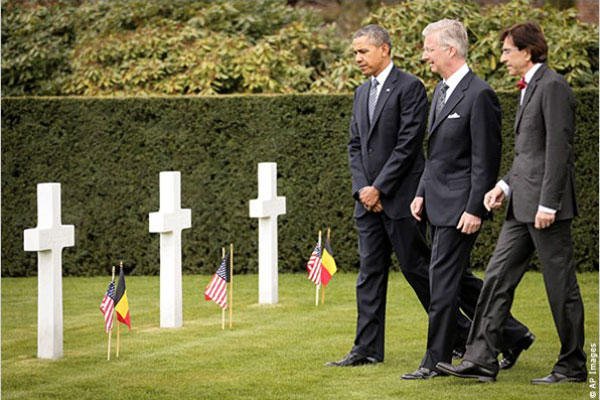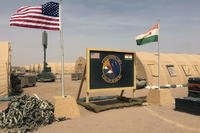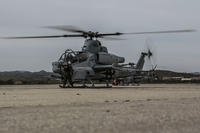President Obama's visit Wednesday to the World War I memorial at Flanders Field took on unexpected symbolism in the effort to avert yet another conflict in Europe.
Obama joined King Philippe and Prime Minister Elio Di Rupo of Belgium at the Flanders Field American Cemetery and Memorial to honor the fallen U.S. "doughboys" of what is known as "The Great War" while an estimated 30,000 Russian troops massed on the borders of Ukraine.
In their remarks at the cemetery, neither Obama nor Philippe referred directly to Ukraine but instead spoke of the lesson learned from World War I, that democracies must stand united against aggression.
"We meet here at a moment of testing for Europe and the United States," Obama said.
At the cemetery, Obama noted that chemical weapons were first used in the Flanders region in 1915 by Germany in World War I, and he pointed to current U.S. efforts to destroy the chemical weapons of Syria, a Russian ally.
"Our nations are part of the international effort to destroy Syria's chemical weapons --the same kinds of weapons that were used to such devastating effect on these very fields," Obama said. "We thought we had banished their use to history, and our efforts send a powerful message that these weapons have no place in a civilized world."
Earlier, the leaders stopped at the gravesites of three Army enlisted personnel, marked by two white crosses and the Star of David.
They were the last resting places of Pvt. Stanislaw Labno, of the 91st Division, Pvt. Russell Swain, 27th Division, and PFC Norman Stein, also of the 27th Division.
Labno was "a young Polish immigrant to America who just a few hours into his very first battle gave his life for his adopted country," Obama said. Swain and Stein were "two men from Brooklyn, N.Y., who lay as they fought, side by side," Obama said.
Philippe told Obama that "we are deeply moved to stand here with you amidst the graves of brave American soldiers who gave their lives for our freedom."
"Our countries have learned the hard way that national sovereignty quickly reaches its limits when confronted by its heavily armed adversaries who do not respect that sovereignty," Philippe said.
Following the wreath-laying ceremony at the cemetery on the outskirts of the Belgian town of Waregem, Obama gave a major speech intended to unite allies behind economic sanctions against Russia for annexing Crimea and threatening eastern Ukraine and Moldova.
The crisis agenda for Obama was a major departure from the original script for the trip. Obama had wanted to focus on curbing the spread of nuclear material and on renewing friendships with Old World allies concerned about the planned U.S rebalance of forces and focus to the Pacific.
Instead, the trip was now meant to show that U.S. leadership of NATO was "as important as ever given the situation in Europe and in Ukraine," said deputy National Security Adviser Ben Rhodes.
The American cemetery at Waregem with 368 gravesites is the smallest of the eight World War I U.S. cemeteries in Europe. The names of 43 other Americans whose deaths were recorded but bodies never recovered are engraved on the walls of the cemetery’s chapel, according to the American Battle Monuments Commission.
The 6.5 acre site of the cemetery was given in perpetuity to the U.S. by the Belgian government.
-- Richard Sisk can be reached at Richard.Sisk@monster.com.




























